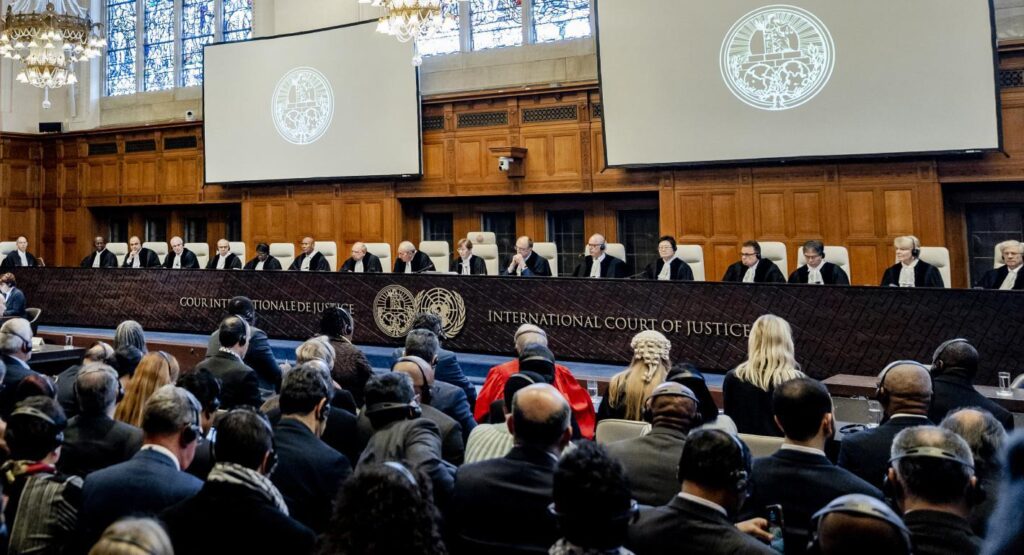In a significant ruling on international property and legal norms, the International Court of Justice (ICJ) has dismissed Equatorial Guinea’s request to block the sale of a lavish Paris mansion owned by Teodorín Obiang, the son of the country’s long-standing president. The decision, rendered amidst ongoing controversies surrounding corruption and the misappropriation of public funds, underscores the complex interplay between national sovereignty and global legal standards. Obiang, often criticized for his extravagant lifestyle in stark contrast to the severe poverty in Equatorial Guinea, faces heightened scrutiny as the case sheds light on the broader implications of wealth derived from alleged organized crime. The ruling is likely to spark renewed discussions around the accountability of political elites and the mechanisms available to combat corruption on a global scale.
ICJ Upholds Transparency in Anti-Corruption Efforts by Denying Equatorial Guinea’s Plea
The International Court of Justice has reaffirmed its commitment to transparency in global anti-corruption efforts by rejecting Equatorial Guinea’s recent bid to halt the sale of a luxurious Paris mansion owned by Teodorín Obiang, the son of the country’s president. This landmark decision underscores the court’s stance against the misuse of public office for personal gain, particularly in nations plagued by high levels of corruption. By denying the plea, the ICJ emphasizes that the properties acquired through corrupt means should be subject to seizure and redistribution, thus supporting the principles of accountability and integrity within governance.
Critics of Obiang’s wealth accumulation have long pointed to the stark contrast between the opulence of his lifestyle and the socioeconomic struggles faced by many citizens in Equatorial Guinea, one of Africa’s richest oil-producing nations. The court’s ruling addresses several key issues, including:
- The need for justice: Ensuring that corrupt leaders are held responsible for their actions.
- Promoting ethical governance: Encouraging transparency within governmental institutions.
- Supporting victims: Helping to restore lost resources to the nation’s citizens.
This ruling not only paves the way for more aggressive actions against illicitly acquired assets but also serves as a reminder to other nations that corruption will not be tolerated on the global stage. The move signals to the international community a growing resolve to dismantle frameworks that allow such abuses of power to flourish.
Examining the Implications of the ICJ’s Ruling on International Asset Recovery
The recent ruling by the International Court of Justice (ICJ) not only highlights the court’s stance on sovereign rights but also sets a significant precedent for international asset recovery efforts. By rejecting Equatorial Guinea’s request to halt the sale of Teodorín Obiang’s opulent Paris mansion, the court emphasized its commitment to combatting corruption and ensuring accountability for illicitly acquired assets. This decision sends a strong message that legal avenues can be pursued effectively to reclaim stolen assets, reaffirming the global community’s resolve in tackling corruption at high levels of governance.
As countries and organizations mobilize to recover assets associated with corrupt practices, the ICJ’s ruling may catalyze similar cases globally. It underscores the importance of international cooperation in asset recovery, urging nations to strengthen their legal frameworks and collaborate to identify, seize, and repatriate assets obtained through illicit means. To further explore the implications, here are some key areas of focus:
- Legal Precedents: The ruling could establish pathways for future claims in international law.
- Impact on Corruption: Enhanced scrutiny on high-profile figures may deter corruption.
- Global Collaboration: Increased coordination among nations to enact effective recovery measures.
Recommendations for Strengthening Global Frameworks Against Corruption and Illicit Wealth
The recent ruling by the International Court of Justice highlights a critical need for enhanced measures to combat corruption and the accumulation of illicit wealth. To effectively tackle these systemic issues, it is essential that countries strengthen their legal and regulatory frameworks. Possible actions include:
- International Cooperation: Nations should improve coordination through treaties and agreements that facilitate information sharing and joint investigations into corruption cases.
- Asset Recovery Mechanisms: Governments need to establish robust processes for tracking, seizing, and repurposing illicitly gained assets, ensuring proceeds support community development.
- Transparency Initiatives: Implementing transparency requirements in the public sector, including asset disclosures for public officials and the publication of financial transactions, can deter corrupt practices.
The creation of standardized reporting frameworks can also play a pivotal role in enhancing accountability. Governments and international organizations should consider adopting a unified framework that encompasses:
| Framework Component | Purpose |
|---|---|
| Implementation of Whistleblower Protections | Promote the reporting of corruption without fear of retaliation. |
| Mandatory Audits of Public Officials | Ensure ongoing scrutiny of the financial dealings of those in power. |
| Increased Penalties for Corruption | Serve as a deterrent against engaging in corrupt activities. |
To Conclude
In conclusion, the International Court of Justice’s dismissal of Equatorial Guinea’s request to halt the sale of Teodorín Obiang’s opulent Paris mansion underscores significant tensions surrounding international law and asset recovery. The ruling not only highlights the complexities of addressing corruption and illicit wealth but also raises questions about accountability at the highest levels of governance. As international scrutiny continues to mount on leaders accused of corruption, the outcome of this case may serve as a pivotal example in the ongoing fight against organized crime and financial misappropriation. The implications of this decision extend far beyond the mansion’s fate, potentially influencing future legal proceedings and international norms regarding the restitution of stolen assets. As the situation develops, stakeholders will be closely monitoring the reactions from both the Equatorial Guinean government and the broader international community.
